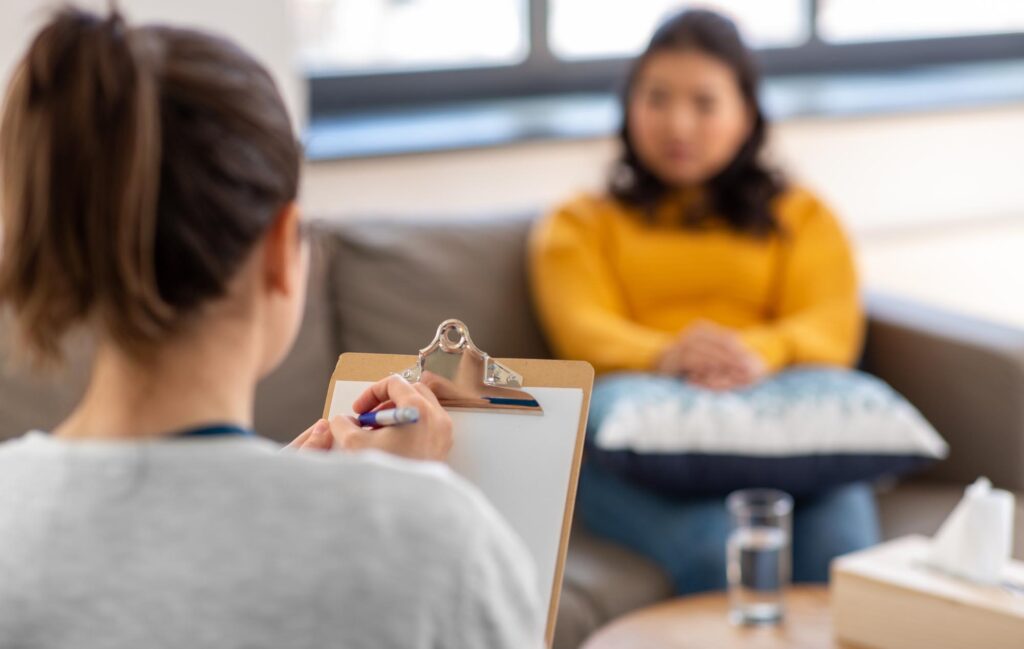Why Individual Therapy Matters in Addiction Recovery
Addiction affects millions of individuals and families, creating complex webs of physical dependence, emotional pain, and disrupted relationships. The journey toward recovery presents unique challenges for each person, as underlying trauma, mental health conditions, and personal circumstances all influence the healing process. Traditional one-size-fits-all approaches often fall short of addressing these deeply personal struggles. Individual therapy for addiction recovery emerges as a cornerstone treatment modality that recognizes the intimate nature of healing.
This therapeutic approach creates a sacred space where individuals can explore their relationship with substances without judgment, uncovering the root causes that drive addictive behaviors. Unlike group settings, individual sessions allow for deep, uninterrupted exploration of personal triggers, family dynamics, and emotional wounds.
The power of one-on-one psychotherapy lies in its ability to adapt to each person’s unique story. A skilled therapist can adjust their approach in real-time, responding to immediate needs and breakthrough moments that arise during sessions. This personalized attention enables individuals to:
- Process complex emotions at their own pace
- Develop tailored coping strategies
- Address co-occurring mental health conditions
- Build trust within a confidential therapeutic relationship
Personalized one-on-one psychotherapy can be a powerful tool for lasting recovery, offering the individualized attention necessary to address the multifaceted nature of addiction and create sustainable pathways to wellness.
You May Also Like: Getting Started in a Drug Rehab Program as a Student
What Are Different Individual Therapy Approaches?
Individual therapy for addiction recovery is a specialized form of one-on-one treatment where trained clinicians work directly with clients to address the complex psychological, emotional, and behavioral aspects of substance use disorders. This therapeutic relationship creates a confidential space for deep exploration of personal triggers, underlying trauma, and unhealthy coping mechanisms that contribute to addictive behaviors.
The world of therapy offers various ways to heal, each focusing on specific parts of overcoming addiction:
Evidence-Based Therapeutic Modalities:
- Cognitive-Behavioral Therapy (CBT) helps individuals identify and restructure negative thought patterns that fuel addictive behaviors, teaching practical skills to manage cravings and high-risk situations
- Motivational Interviewing enhances intrinsic motivation for change by exploring ambivalence about recovery and strengthening commitment to sobriety
- Contingency Management uses positive reinforcement to encourage healthy behaviors and treatment engagement
Abhaya Wellness Specialized Approaches:
- Mindfulness-based psychotherapy integrates present-moment awareness practices into the therapeutic relationship, helping clients develop non-judgmental awareness of thoughts and emotions
- Dialectical Behavior Therapy (DBT) addresses emotion regulation and impulse control challenges common in addiction
- Trauma-focused therapy processes underlying traumatic experiences that often contribute to substance use as a coping mechanism
- Psychoanalytic and psychodynamic therapies explore unconscious patterns and early life experiences influencing current behaviors
- Humanistic therapies promote self-understanding, acceptance, and compassion as foundations for lasting recovery
Each approach addresses different facets of addiction, from immediate behavioral changes to deep-rooted psychological patterns, creating comprehensive pathways to sustainable healing.

What Are the Benefits of Individual Therapy in Addiction Recovery?
Individual therapy for addiction recovery creates a protected therapeutic environment where healing can unfold without external judgment or distraction. The confidential one-on-one setting allows individuals to explore deeply personal experiences, traumas, and triggers that may feel too vulnerable to share in group settings. This privacy fosters honest self-examination and enables therapists to address sensitive topics that might otherwise remain hidden barriers to recovery.
The personalized nature of individual sessions means treatment plans adapt to each person’s unique circumstances, learning style, and recovery timeline. Sessions can accommodate work schedules, family obligations, and personal preferences, making consistent engagement more achievable. This flexibility proves especially valuable for individuals balancing recovery with professional responsibilities or caregiving duties.
Co-occurring mental health conditions receive targeted attention through individual therapy. When addiction intersects with depression, anxiety, bipolar disorder, or trauma-related symptoms, therapists can simultaneously address both conditions using integrated treatment approaches. This dual focus prevents one condition from undermining progress in treating the other.
Individual sessions cultivate essential life skills that extend beyond addiction recovery. Clients develop enhanced self-awareness, learning to recognize emotional patterns, identify personal triggers, and understand their relationship with substances. Communication skills strengthen through therapeutic dialogue, preparing individuals to navigate challenging conversations with family members, employers, and peers while maintaining their recovery commitments.
Comparing Individual Therapy with Other Treatment Modalities
Individual therapy for addiction recovery offers distinct advantages when compared to other therapeutic approaches, each serving unique purposes in the healing journey. Understanding these differences helps individuals make informed decisions about their treatment path.
Group Therapy: Collective Healing vs. Personal Focus
Group therapy provides valuable peer connection and shared experiences, allowing participants to witness others’ recovery journeys and feel less isolated in their struggles. The cost-effectiveness makes it accessible to more people seeking support. However, group settings may limit the depth of personal exploration due to time constraints and the need to accommodate multiple participants’ needs.
Individual therapy creates space for deeper self-examination without the pressure of sharing vulnerable experiences with peers. This privacy allows for more intensive work on personal trauma, shame, and specific behavioral patterns that might feel too sensitive to discuss in group settings.
Family and Couples Therapy: Healing Relationships
Family counseling addresses systemic patterns and communication breakdowns that often contribute to addiction cycles. These sessions help repair damaged relationships and create supportive home environments essential for sustained recovery.
Abhaya Wellness offers both family therapy and couples therapy as complementary services, recognizing that addiction affects entire family systems. When combined with individual sessions, these modalities create comprehensive support networks that address both personal healing and relational restoration.
Peer support serves as a powerful complement to individual therapy, providing ongoing encouragement and accountability between professional sessions.
Integrating Individual Therapy Within Comprehensive Addiction Treatment Programs
Individual therapy for addiction recovery achieves maximum effectiveness when woven into a comprehensive treatment framework rather than standing alone. This integrated approach recognizes that addiction affects multiple dimensions of a person’s life, requiring diverse therapeutic interventions working in harmony.
Successful outpatient rehab settings combine individual therapy with complementary treatment components:
- Medical supervision for withdrawal management and medication-assisted treatment
- Group therapy sessions that provide peer connection and shared learning experiences
- Family therapy to repair relationships and build supportive home environments
- Psychiatric care for co-occurring mental health conditions
- Case management to address practical life challenges like housing or employment
The therapeutic relationship established in individual sessions becomes the foundation that supports engagement across all treatment modalities. When clients develop trust and communication skills through one-on-one work, they’re better equipped to participate meaningfully in group settings and family sessions.
This holistic model ensures that while individual therapy addresses personal triggers and thought patterns, other components tackle social, medical, and practical aspects of recovery, creating multiple pathways to sustained wellness.
Challenges to Consider in Individual Therapy for Addiction Recovery
While individual therapy for addiction recovery offers profound benefits, certain barriers can impact accessibility and treatment decisions.
Cost
Cost represents the most significant challenge, as one-on-one sessions typically require higher investment compared to group therapy formats. Insurance coverage varies widely, and many individuals face substantial out-of-pocket expenses that may limit session frequency or duration.
Scheduling Constraints
Scheduling constraints present another hurdle, particularly for those balancing work, family responsibilities, or transportation limitations. The intensive nature of individual sessions demands consistent commitment, which can prove challenging during early recovery when life circumstances remain unstable.
Availability of Specialized Therapists
Availability of specialized therapists trained in addiction-specific modalities may be limited in certain geographic areas, creating waiting lists or requiring travel to access quality care. These practical considerations require careful evaluation when designing personalized treatment approaches.
You May Also Like: How Therapy Helps Boost Self-Esteem
Practical Strategies Offered Through Individual Therapy at Abhaya Wellness
At Abhaya Wellness in Durham, NC, individual therapy for addiction recovery combines evidence-based methods with our mindfulness-centered approach. Our therapeutic process begins with building a strong therapist-client relationship based on trust and respect, creating a safe and non-judgmental space for healing.
Mindfulness and Addiction Recovery
Our unique approach to mindfulness and addiction recovery is designed to help clients navigate their recovery journey more effectively. We integrate cognitive-behavioral techniques into mindfulness practices, allowing clients to:
- Identify thought patterns related to addiction
- Develop awareness of the present moment
This combination enables individuals to observe their triggers without reacting immediately, creating room for healthier responses.
Motivational Interviewing Techniques
We enhance our motivational interviewing techniques through mindful listening and compassionate inquiry. This supports clients in discovering their own reasons for wanting to change.
Specialized Therapies
Our diverse team brings various specialties to individual therapy for addiction recovery, including:
- Dialectical behavior therapy (DBT) for managing emotions and controlling impulses
- Trauma-focused therapy that addresses underlying traumatic experiences
- Psychodynamic approaches that explore unconscious patterns influencing behavior
- Humanistic therapies that promote self-understanding and self-compassion
Experiential Practices
Each therapeutic relationship includes experiential practices—such as mindfulness, movement, art, or music—that are tailored to individual preferences and needs. This personalized approach recognizes that each person’s path to wellness is unique.
Overcoming Barriers
By incorporating these practices, clients can:
- Explore obstacles preventing them from living fulfilling lives
- Develop sustainable strategies for recovery
We also offer comprehensive mental health services that further support our clients’ overall well-being.

Taking the Next Step Towards Lasting Recovery with Individual Therapy at Abhaya Wellness
Recovery from addiction requires courage, commitment, and the right support system. Individual therapy for addiction offers a personalized pathway that honors your unique journey while providing the clinical expertise necessary for sustainable healing.
At Abhaya Wellness, we understand that each person’s relationship with addiction is deeply personal. Our mindfulness-inspired approach to individual therapy creates space for you to:
- Develop authentic coping strategies that align with your values
- Process underlying trauma or co-occurring mental health conditions
- Build the self-awareness needed for long-term recovery
- Strengthen your connection to present-moment wellness practices
The therapeutic relationship becomes a foundation for rebuilding trust—both with yourself and others. Through our eclectic team of clinicians, you’ll find someone who resonates with your specific needs and recovery goals.
Ready to explore how individual therapy can support your recovery journey? Connect with Abhaya Wellness today to discuss tailored treatment options that integrate seamlessly with your holistic wellness plan. Your path to lasting recovery begins with a single, courageous step forward.
FAQs (Frequently Asked Questions)
Why is individual therapy important in addiction recovery?
Individual therapy offers personalized one-on-one psychotherapy, which serves as a powerful tool for lasting addiction recovery by addressing unique challenges and fostering self-awareness.
What are the common individual therapy approaches used in addiction treatment?
Common approaches include Cognitive-Behavioral Therapy (CBT), Motivational Interviewing, Contingency Management, Mindfulness-Based Psychotherapy, Dialectical Behavior Therapy (DBT), Trauma-Focused Therapy (TFT), Psychoanalytic and Psychodynamic Therapies, and Humanistic Therapies such as person-centered therapy.
What benefits does individual therapy provide in addiction recovery?
Individual therapy provides confidentiality, focused attention, a personalized and flexible approach tailored to individual needs and schedules, effective treatment of co-occurring disorders like depression or bipolar disorder, and development of essential self-awareness and communication skills for sustained recovery.
How does individual therapy compare with group and family counseling in addiction treatment?
While group and family counseling offer valuable peer support and relational dynamics, individual therapy provides focused one-on-one attention tailored to personal needs. Abhaya Wellness complements individual therapy with family and couples therapy to create a comprehensive support system.
How is individual therapy integrated within comprehensive outpatient addiction treatment programs?
Individual therapy is combined with other treatment components in outpatient rehab settings to address various aspects of recovery holistically, ensuring personalized care alongside group sessions, family involvement, and experiential practices.
What practical strategies does Abhaya Wellness use in individual therapy for addiction recovery?
Abhaya Wellness tailors cognitive-behavioral techniques and motivational interviewing within a mindfulness-based framework. Their eclectic team integrates experiential practices like mindfulness, movement, art, and music into a safe, non-judgmental therapeutic relationship designed to foster lasting wellness.
